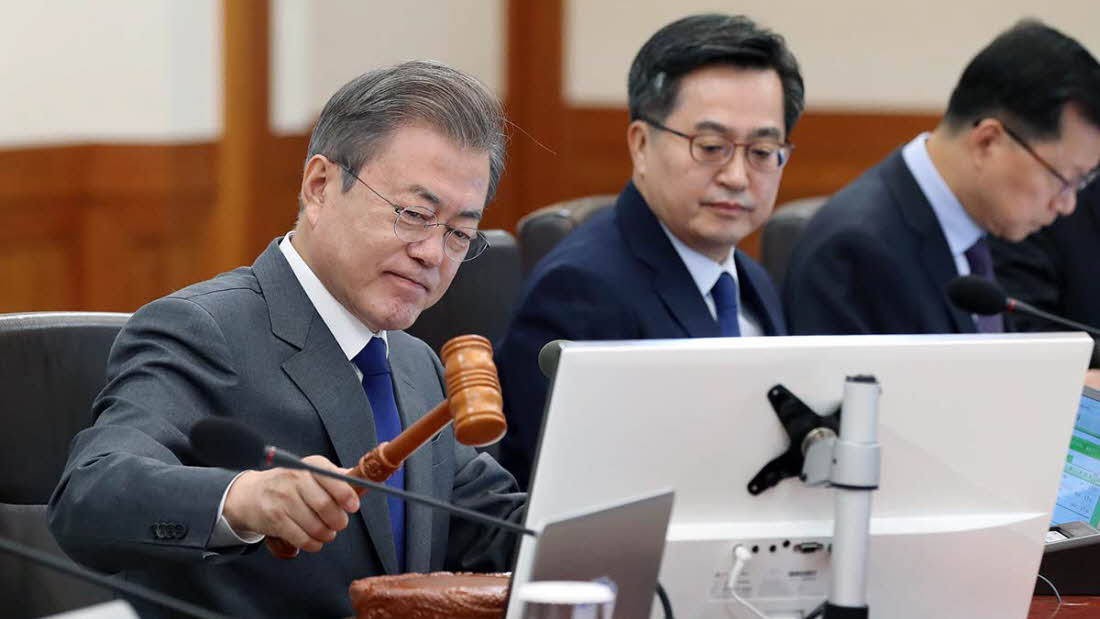이 웹사이트는 제19대 대통령 임기 종료에 따라 대통령기록관이 「대통령기록물 관리에 관한 법률」에 의해 이관받아 서비스하는 대통령기록물입니다. 자료의 열람만 가능하며 수정 · 추가 · 삭제는 불가능합니다.
다만, 「개인정보보호법」에 의하여 개인의 정보를 보호받기 원하시는 분은 관련 내용(요청자, 요청내용, 연락처, 글위치)을 대통령 웹기록물 담당자(044-211-2253)에게 요청해 주시면 신속히 검토하여 조치해 드리겠습니다. 감사합니다.
SPEECHES & REMARKS
BRIEFINGS

I just returned from a trip to attend annual ASEAN-related summits and the APEC Economic Leaders’ Meeting. I could truly sense the tremendous changes from a year earlier. Every single head of state and government spoke highly about the positive changes to the situation on the Korean Peninsula, calling them miraculous and expressing support.
Moreover, they showed keen interest in Korea’s vision of becoming an innovative, inclusive nation where everyone can prosper together. I could also reaffirm the fact that inclusive growth, the mitigation of gaps and a people-centered economy are common concerns not only to us but also to all other nations.
Regarding the New Southern Policy that pursues peace and mutual prosperity by putting the top priority on people, ASEAN, India and Australia welcomed the initiative and expressed their intent to cooperate. Just as ASEAN and India have great interest in us, we should channel extraordinary attention and efforts into promoting reciprocal relations with these nations.
A few statistics are sufficient to show just how important ASEAN and India are to Korea, to the extent that it is safe to say that our future is at stake. In terms of trade and exports, ASEAN has become Korea’s second largest market, following China. Korea's trade with and exports to ASEAN over the last year alone saw increases of 25 percent and 28 percent, respectively. ASEAN is the region that Koreans visit the most and the gateway for promoting Hallyu [the Korean wave] culture.
Vietnam has a population of 100 million with a 7 percent economic growth rate. Last year alone, Korea's trade with the country soared by 42 percent, and its exports increased by 46 percent. Vietnam has already become Korea's third largest export destination, following China and the United States. Indonesia has a population of 260 million, and its average age is a youthful 29. In addition, its economy is expanding rapidly.
India is expected to become the world’s most populous country and a member of the group of three [G3] a few years later. Korea’s trade with and exports to India increased nearly 30 percent last year. It is confirmation that the New Southern Policy is very significant in expanding bilateral economic cooperation and diversifying Korea’s export markets.
I hope that related ministries, with the Presidential Committee on New Southern Policy playing a central role, will do their utmost to identify substantive cooperation projects and produce achievements that build upon the results of the ASEAN-related summits and the APEC Economic Leaders’ Meeting. In addition to cooperation in the economic and diplomatic realms, I ask related ministries to plan the types of multi-layered cooperation that can create genuine heart-to-heart connections by promoting cultural and people-to-people exchanges.
In particular, it was agreed at the ASEAN-Republic of Korea Summit that the 2019 ASEAN-Republic of Korea Commemorative Summit and the inaugural Korea-Mekong summit would be held in Korea next year. Since these are not only the first multilateral summits to be held in Korea under the current Administration but also opportunities to further promote economic cooperation and people-to-people exchanges, I hope that a government-wide taskforce will be formed in advance to make thorough preparations.
Recently, Korea’s manufacturing sector has had noteworthy news. The production of automobiles had dwindled year-on-year due to difficulties stemming from a decrease in exports and corporate restructuring, but it began to show a rebound from August through October. As for Korea’s shipbuilding, new building orders from January to October have increased 71 percent from the same period a year earlier, retaking the world’s top ranking with a global market share of 44 percent.
It is welcome news made by businesses expanding investments and mutually beneficial cooperation with suppliers amidst such difficult conditions as the global spread of protectionism and the United States-China trade dispute.
Manufacturing is the foundation of our economy and is Korea’s main strength. Only when manufacturing picks up steam will local economies be revitalized and the economy as a whole be able to grow further. Currently, however, small and medium-sized shipbuilding, equipment and materials, and auto parts businesses are still suffering from lack of orders and financial difficulties. In this challenging moment, the Government is duty bound to provide support so businesses can muster their energy.
To ease the difficulties experienced by auto parts manufacturers, not only short-term measures, such as extending the due dates on their loans, but also mid- to long-term assistance should be pursued simultaneously, including support for research and development to help them transition into future-oriented businesses that develop eco-friendly autonomous vehicle technologies.
I hope that measures to revitalize small and medium-sized shipbuilders, such as financing for early-stage assembly, refund guarantee-related assistance and support for developing high value-added ships, will also be actively sought. As with the Korean saying “Paddle out as the tide comes in” [akin to “Strike while the iron is hot” in English], I ask you to do your best to make the most of opportunities.



